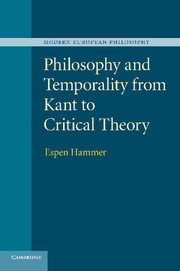Book contents
- Frontmatter
- Contents
- Acknowledgments
- Introduction
- 1 The historicity of time
- 2 Modern temporality
- 3 Two responses to the time of modernity
- 4 Hegel's temporalization of the absolute
- 5 Schopenhauer and transcendence
- 6 Time and myth in the early Nietzsche
- 7 Recurrence and authenticity: the later Nietzsche on time
- 8 Heidegger on boredom and modernity
- 9 A modernist critique of postmodern temporality
- Conclusion
- Bibliography
- Index
- References
6 - Time and myth in the early Nietzsche
Published online by Cambridge University Press: 21 April 2011
- Frontmatter
- Contents
- Acknowledgments
- Introduction
- 1 The historicity of time
- 2 Modern temporality
- 3 Two responses to the time of modernity
- 4 Hegel's temporalization of the absolute
- 5 Schopenhauer and transcendence
- 6 Time and myth in the early Nietzsche
- 7 Recurrence and authenticity: the later Nietzsche on time
- 8 Heidegger on boredom and modernity
- 9 A modernist critique of postmodern temporality
- Conclusion
- Bibliography
- Index
- References
Summary
Nietzsche's views on time develop and alter significantly from his first published writings in the early 1870s until his final and frantic philosophical efforts ending with the collapse in January 1889. Against the widespread view of him as not having had much to say about time until the first formulation of the doctrine of the eternal return of the same appears in section 341 of The Gay Science in 1882, hence well into the so-called middle period, I argue that the question of time remains crucial from the very early phase of his work, and that it continues to be decisive as his thinking gradually liberates itself from the initial infatuation with Richard Wagner's works and Schopenhauer's metaphysics.
Nietzsche never presents any systematic philosophy of time, nor indeed a genuinely systematic account of any philosophical topic. He thus deliberately breaks with the German idealists, for whom systematicity had been an overriding concern. However, Nietzsche goes further than simply rejecting the demanding idealist model of systematicity. The aphoristic style adopted in the middle and final periods seems deliberately designed to avoid the very possibility of linear argumentation. Its replacement of inferential linearity with sequences of sections that at best may be tied to one another by virtue of a common theme, where each section seems complete and self-sufficient, yet without, in most cases, the traditional means – thesis, clearly identifiable arguments, the observation of valid rules of inference, and relative completeness – for legitimating it as philosophy, may seem to push Nietzsche in the direction of “the literary.”
- Type
- Chapter
- Information
- Philosophy and Temporality from Kant to Critical Theory , pp. 125 - 143Publisher: Cambridge University PressPrint publication year: 2011

